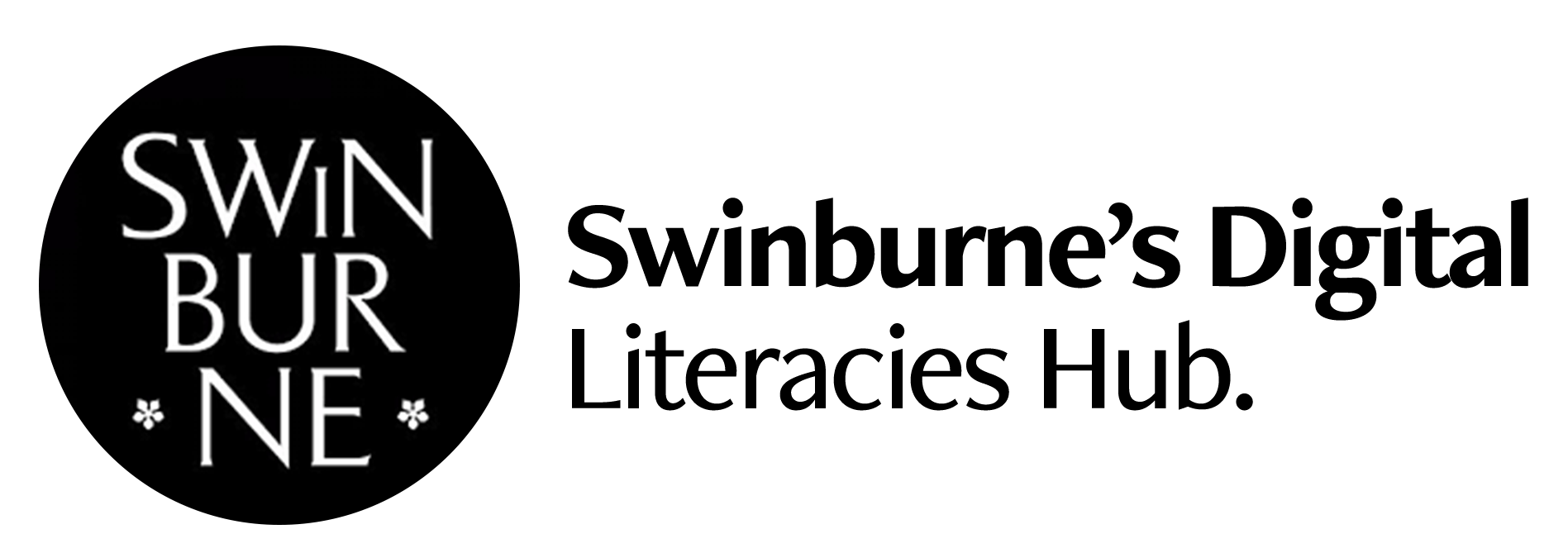Digital Literacies.
Teaching & Learning
Teaching & Learning
Here are some resources to get you started. To make it simpler, we've broken down our suggestions into teaching, practising and assessment.
* * * Teaching might include new teaching approaches, modelling creating how to create industry artefacts or using new technologies to deliver content
* * * Practising might include small un-marked drafts, feedback from peers, industry or user testing
* * * Assessing might include changing assessment items to a new modality or giving students options to submit a traditional assessment on a different platform
Please reach out if you need anything and you can't find it here!
Please reach out if you need anything and you can't find it here!
Digital Literacies - starting considerations.
Digital literacies might be new to you, or you aren't confident what it might mean at Swinburne.
Find out about the Digital Literacies pillars and some considerations to help you start embedding them into your teaching.
Find out about the Digital Literacies pillars and some considerations to help you start embedding them into your teaching.
A New Stream of Innovation: Curriculum Innovator Program
Scaffolding from Novice to Emerging Practitioner.
Want to start scaffolding digital literacies into your teaching? We have provided some simple ideas that take you through from Novice, to Associate and then Emerging Practitioner, no matter what year you're teaching.
Re-imagining your assessment.
Need some support re-imagining your assessment items to foreground Digital Literacies?
We've created four examples for you to consider, including potential learning outcomes.
Examples by type and discipline.
Want to get inspired by other teaching and assessment examples at Swinburne? Find out what's happening here and how you can use shareable resources.
Further resources.
There are a number of professional develop programs to support staff to expand staff their own digital skills and there are a number of teaching resources available for these graduate attributes:
* Learning Transformation Unit – workshops and drop-in sessions (Links to an external site.)
* Adobe Creative Campus Hub on Canvas – online Adobe tutorials for staff and students (Links to an external site.)
* Adobe Hub – level 3 of the library – students can book on-on-one sessions with coaches (Links to an external site.)
* Adobe Digital Coaches – staff can book Adobe Coaches to come into teaching sessions (Links to an external site.)
* Adobe Education Exchange – teaching resources in all disciplines from around the globe (Links to an external site.)
* Digital Literacies Hub – Swinburne resources, examples and workshops (Links to an external site.)
* Adobe Labs – recordings from all of our Adobe specialist workshops
Publications.
Resources for Learning & Teaching.
Iqbal Malik, S. and Coldwell-Neilson, J (2017), Impact of a new teaching and learning approach in an introductory programming course Vol. 55, pp. 789-819, Journal of Educational Computing Research, Thousand Oaks, Calif., C1
Iqbal Malik, S. and Coldwell-Neilson, J (2017), Impact of a new teaching and learning approach in an introductory programming course Vol. 55, pp. 789-819, Journal of Educational Computing Research, Thousand Oaks, Calif., C1
Iqbal Malik, S. and Coldwell-Neilson, (2017), Comparison of tradition and ADRI based teaching approaches in an introductory programming course Vol. 16, pp. 267-283, Journal of information technology education: research, Santa Rosa, Calif., C1
Coldwell-Neilson, J. (2017): Assumed Digital Literacy knowledge by Australian Universities: are students informed? Proceedings of Australian Computer Education Conference, ACE '17, January 31 - February 03, 2017, Geelong, VIC, Australia.
Coldwell-Neilson, J (2018) Digital Literacy expectations in Higher Education, Proceedings of the Australasian Society for Computers in Learning in Tertiary Education, ASCILITE '18, 25-28 November. Geelong, Australia.
Coldwell-Neilson, J., Armitage, J. A., Wood-Bradley, R. J., Kelly, B., & Gentle, A. (2019). Implications of updating digital literacy – A case study in an optometric curriculum. Issues in Informing Science and Information Technology, 16, 33-49. https://doi.org/10.28945/4285
Coldwell-Neilson, J. (2017), Digital literacy – a driver for curriculum transformation Vol. 40, pp. 84-94, HERDA 2017 : Research and development in higher education: curriculum transformation : Proceedings of the 40th HERDSA Annual International Conference, Sydney, N.S.W., E1
O’Donnell M. (2020) Assessment as and of Digital Practice: Building Productive Digital Literacies. In: Bearman M., Dawson P., Ajjawi R., Tai J., Boud D. (eds) Re-imagining University Assessment in a Digital World. The Enabling Power of Assessment, vol 7. Springer, Cham.
Media Literacy for Children & Young People.
Notley, T and Dezuanni, M 2020, ‘3 ways to help children think critically about the news’, The Conversation.
Notley, T, Dezuanni, M, Zhong, HF 2019, ‘The inclusion and representation of young people in the Australian news media’, Research report, Western Sydney University and Queensland University of Technology.
Notley, T and Dezuanni, M 2019, ‘On an average day, only 1% of Australian news stories quotes a young person. No wonder so few trust the media’, The Conversation.
Notley, T & Dezuanni, M 2019, ‘Advancing children’s news media literacy: learning from the practices and experiences of young Australians’, Media, Culture & Society, 41(5): 689-707.
Notley, T, Dezuanni, M, Zhong, HF & Howden, S 2017, News and Australia’s children: how young people access, perceive and are affected by the news, Research Report, Sydney, Crinkling News, Western Sydney University and Queensland University of Technology.
Notley, T and Dezuanni, M 2017, ‘Most young Australians can’t identify fake news online’, The Conversation.
Digital Literacies.
Teaching & Learning
Teaching & Learning
